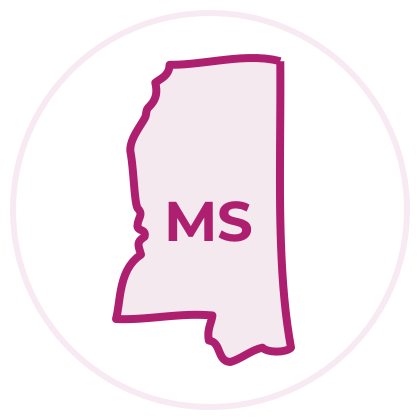Pre-Service Training
The Mississippi Department of Child Protection Services (MDCPS) provides 15.5 hours of mandatory pre-service training, called Mississippi Path Training, to prospective foster and adoptive families. Delivered in a hybrid format by MDCPS Licensure Unit, this training is required for all caregiving adults in the household.
Services Offered Through the State’s Post-Permanency Support Program
The Mississippi Department of Child Protection Services (MDCPS) contracts with Southern Christian Services for Children and Youth, Inc. (SCSCY) to provide statewide post-permanency support for adoptive families and with Catholic Charities for respite services. Families can access these voluntary services through the state’s Adoption Assistance Coordinators or by self-referral.
Services include:
SCSCY provided counseling and case management to 131 families in fiscal year 2023.
For more information, visit:
- Southern Christian Services for Children and Youth, Inc. — https://www.scscy.org/adoptionpermanencyservices
- Catholic Charities — https://www.catholiccharitiesjackson.org/
Geographic Area Covered
Southern Christian Services for Children and Youth, Inc. (SCSCY) serves the entire state. However, there is variation for respite, as there may not be available providers. Only families living in Hinds County can receive in-person counseling; the rest of the state is served via telehealth.
Eligible Population for the Overall Post-Permanency Program
Outreach and Engagement
MDCPS provides both SCSCY and Catholic Charities a list of finalized adoptions every month. SCSCY then mails each family information about available services, including contact details. They also attempt follow-up calls at one, three, and six months after adoption.
SCSCY markets services through community events. Program details are also shared through MDCPS in-service trainings, community outreach events, social media, and youth courts.
How the Post-Permanency Program Is Operated
Notes About Who Provides Which Service(s)
Catholic Charities only provides respite services in central part of the state, including Hinds, Madison, and Rankin Counties. SCSCY provides all other services.
Adoption/Guardianship Assistance/Subsidy Review and Changes
Adoption assistance is reviewed annually. Adoption Assistance Coordinators call families 30 days before the subsidy renewal date. During the call, families verify their address, contact information, and the child’s status regarding needs, stability, and support. If the family is unreachable by phone, the Adoption Assistance Coordinator sends a certified letter.
Adoption subsidies can be renegotiated until the child turns 18. To request a review, families must contact their assigned Adoption Assistance Coordinator, complete the Application for Renegotiation of Adoption Assistance form, and provide documentation.
Tracking Adoption/Guardianship Discontinuity
If a child who was previously in care returns, the assigned Wellbeing and Permanency Specialist completes the Report of Dissolution form, which is then sent to the State Office for review and possible action.
Post-Permanency Program Spending (FY 2023)
Funding Sources for the Post-Permanency Program (FY 2023)
- Title IV-B, Part 2 (Promoting Safe and Stable Families/PSSF)
- State Funds


